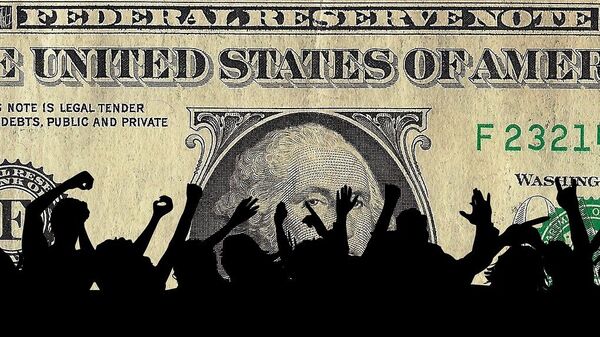WASHINGTON (Sputnik) — The US federal government’s soaring national debt may hinder efforts to finance wars or prime the domestic economy to escape recessions, analysts told Sputnik.
The US national debt exceeded $20 trillion for the first time in its history last week when President Donald Trump signed into law a bipartisan bill that authorized temporarily raising the debt limit from $19.84 trillion by another $318 billion over the next three months.
Economic Growth 'Fantasies'
"We do not have as much leeway now to fight recession and wars," retired Brown University Assistant Professor of Economics Barry Friedman said. "Let us please not fantasize about ‘growing our way out of trouble’ in the words of our beloved Ronald Reagan."
Trump would also be unwise to push for raising interest rates to attract more Foreign Direct Investment (FDI) into the United States as such a move would risk setting off a harmful inflation, Friedman cautioned.
The US government and financial institutions up to now have failed to use debt productively to finance construction and infrastructure renewal, Friedman noted.
"GDP [Gross Domestic Product] last year was $18 trillion. If we were using debt productively, as in home ownership and infrastructure, $20 trillion would not be excessive leverage," he said.
The growing US debt threatened to erode the US comparative advantage over high spending European democracies in attracting finance, despite the enormous annual US trade deficit, Friedman acknowledged.
"We are getting to a ratio pushing IMF [International Monetary Fund] and European standards," he said.
Total federal tax revenue was $3.46 trillion in fiscal year 2017, Friedman noted.
"This is not a heavy tax burden compared to OECD countries. Interest payments on the debt were $266 billion. This is obviously not a heavy burden on revenue," he said.
Hurricane Complications
Eurasian Business Coalition Vice President Ralph Winnie told Sputnik that Trump’s decision to raise the legal limit on the national debt to more than $20 trillion reflected the serious damage that recent Hurricanes Harvey and Irma had have done to the economy in the major states of Florida and Texas.
"What makes the latest rise in the US national debt very problematic is the financial cost of the flooding experienced from Hurricanes Harvey and Irma. They have required immediate emergency funding," he explained.
"I don’t think Trump did this willingly in approving the raising of the national debt ceiling. Only time will tell what the fiscal consequences of this move will be," he said.
The underlying problem the US government and Congress faced was that the US public had gotten used to living in debt and taking soaring public deficits for granted, Winnie warned.
"We have to change the mindset so that people save and invest more. In China more than 50 percent of income is saved. They have the opposite problem form the United States. They want to get people to spend more," he said.
Trump was unlikely to face serious protests from Republican budget hawks as they recognized the urgent need to finance immediate reconstruction after the hurricanes, Winnie observed.
However, the US public could not put off the pressing need to tackle the long-term debt crisis as quickly as possible, Winnie predicted.
"In the long run, as a country you can’t survive with ever-increasing levels of public debt. It is going to be a long, slow process to change the saving and spending habits of the American people. Trump is going to have to be aggressive in cutting government spending," he said.
The Senate approved the higher borrowing limit by 80 votes to 17 last Thursday and the House of Representatives then also passed it by 316 votes to 90 on Friday. Both votes would have overrode any veto by Trump had he tried to block the legislation.



